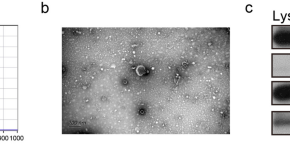
Collection
Methods and applications of multi-omics data analysis in human genetic disease
- Submission status
- Closed
Multi-omics research is increasingly recognized as being important for understanding and prediction of complex diseases. Driven by technological advances, many cost-effective and high-throughput technologies have become available to generate omics data, from quantification of the expression level to comprehensive profiling of RNA, protein, lipids, microbiome, metabolites and the genome. The availability of multi-omics data stimulates the development of novel bioinformatics and statistical approaches. A number of integrative multi-omics analysis approaches have been developed for improving classification of disease into clinically relevant subgroups and identifying disease related biomarkers. By employing effective analytical approaches, omics data can also facilitate unravelling biological networks regulating transitions from health to disease and discovering novel mechanisms of human genetic diseases. With increasing quality, diversity, and quantity of the multi-omics data, the analysis and application of multi-omics data may further shift the practice of health monitoring, early screening, disease management, and therapeutic development.
Potential topics include, but are not limited to: 1) Methods of sequencing reads analysis, including long read sequencing, 2) Prioritizing pathogenic mutations through multi-omics data analysis, 3) Integrating omics data in drug discovery, and 4) Methods/applications of single-cell sequencing data analysis, including spatial transcriptomics analysis and single-cell multi-omics
NOTE: Manuscripts using existing bioinformatics tools on publically available data sets without experimental validation will not be considered.
Editors
-
Prof. Huiying Zhao
Huiying Zhao is a Professor at the Sun Yat-sen Memorial Hospital of Sun Yat-sen University. Her research mainly focuses on developing computational approaches for integrating mult-omics data to reveal disease mechanisms and repurpose drugs.
-
Dr. Maggie Wang
Maggie Wang is an Associate Professor at The Chinese University of Hong Kong. Her research develops statistical methods for human genome association testing and prediction for complex traits such as the Alzheimer’s disease. She also develops methods for modelling virus evolution and mutation patterns for improved vaccine design with applications on the influenza virus and SARS-CoV-2.
Articles (10 in this collection)
-

-
A novel network-based method identifies a cuproplasia-related pan-cancer gene signature to predict patient outcome
Authors (first, second and last of 9)
- Vu Viet Hoang Pham
- Toni Rose Jue
- Orazio Vittorio
- Content type: Original Investigation
- Open Access
- Published: 20 April 2024
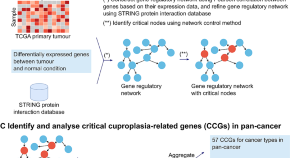
-
Phenotypic and genetic effect of carotid intima-media thickness on the risk of stroke
Authors (first, second and last of 25)
- Wenqiang Zhang
- Jingwei Zhu
- Ben Zhang
- Content type: Original Investigation
- Published: 05 April 2024

-
The crucial prognostic signaling pathways of pancreatic ductal adenocarcinoma were identified by single-cell and bulk RNA sequencing data
Authors (first, second and last of 9)
- Wenwen Wang
- Guo Chen
- Jielai Xia
- Content type: Original Investigation
- Open Access
- Published: 25 March 2024
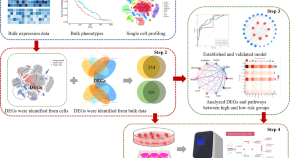
-
Genetic evidence for T-wave area from 12-lead electrocardiograms to monitor cardiovascular diseases in patients taking diabetes medications
Authors (first, second and last of 7)
- Mengling Qi
- Haoyang Zhang
- Huiying Zhao
- Content type: Original Investigation
- Published: 20 March 2024

-
Bayesian network-based Mendelian randomization for variant prioritization and phenotypic causal inference
Authors (first, second and last of 8)
- Jianle Sun
- Jie Zhou
- Yue Zhang
- Content type: Original Investigation
- Published: 21 February 2024
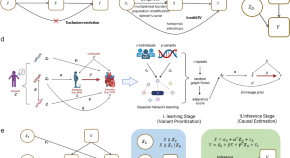
-
Identification of TACSTD2 as novel therapeutic targets for cisplatin-induced acute kidney injury by multi-omics data integration
Authors (first, second and last of 6)
- Zebin Deng
- Zheng Dong
- Fei Deng
- Content type: Original Investigation
- Published: 18 February 2024
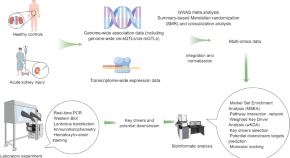
-
Bi-allelic missense variants in MEI4 cause preimplantation embryonic arrest and female infertility
Authors (first, second and last of 17)
- Zhiqi Pan
- Weijie Wang
- Biaobang Chen
- Content type: Original Investigation
- Published: 22 January 2024
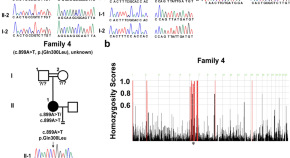
-
Protein-centric omics integration analysis identifies candidate plasma proteins for multiple autoimmune diseases
Authors (first, second and last of 8)
- Yingxuan Chen
- Shuai Liu
- Zhongshang Yuan
- Content type: Original Investigation
- Open Access
- Published: 24 December 2023
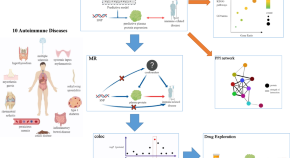
-
Plasma-derived exosomal miRNA profiles reveal potential epigenetic pathogenesis of premature ovarian failure
Authors (first, second and last of 8)
- Jiaqiong Lin
- Zhihong Wu
- Fu Xiong
- Content type: Original Investigation
- Published: 06 December 2023
